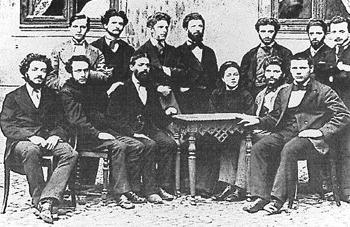The Duma of Lermontov was written in 1838, at that timetime when the writer returned from exile. The poem is written in a poetic form widely used at that time by the Decembrist poets. In genre, the work, as well as the "Death of the Poet", belongs to the elegy-satire. Mikhail Yuryevich in the "Duma" reproaches his generation for cowardice, inaction and indifference. Young people condemn the mistakes of the generation of "fathers", but they do not do anything themselves, refusing to fight and not taking part in public life.
The main theme of the poem

"Lomontov's Duma" does not direct its satire tocourt society, which was once evil poet, but to the entire noble intelligentsia of the 30s of the XIX century. The writer gives a characterization to the entire generation to which he belongs, for good reason he uses the pronoun "we". Mikhail Yurievich reproaches himself for inaction, equates him to helpless and miserable people who have done nothing for posterity. The generation of the 1810s-1820s was completely different, the freedom-loving Decembrists grew out of it, even if they made a mistake and brutally paid for it, but at least they tried to change the country for the better.
The poet sincerely regrets that he was not born onseveral decades earlier, because his contemporaries are boring and useless for society. They are not interested in art or poetry, they do not talk about good and evil, they try to keep their neutrality and not provoke the wrath of power, have withdrawn from public life, taking up a "barren science", and this is not what Lermontov wanted. The Duma, whose theme reveals the character of the entire generation of the 1830s, is devoted to the public behavior of a person, it is a cry of the tormented soul of the poet.
Contemplation of the past, present and future

"Duma" Lermontov clearly shows how a writerrefers to the generation of "fathers", contemporaries and descendants. Mikhail Yurievich admires the courage and bravery of the Decembrists, let them be mistaken, but their heroic deeds left their mark on the history of the country, stirred the public, initiated a popular protest against the tyranny of those in power. At the same time, Lermontov's contemporaries are not mistaken in anything, but they do not do anything. The soul of the poet is eager to fight, he wants to change something, express his protest, but does not see like-minded people, and alone it is pointless to struggle. "Duma" Lermontov is a pity for the time in vain.
Civil trial of contemporaries

To make the poem more vivid andit is more accessible to express one's thought, the author used epithets that bare emotions, metaphorical metaphors, words in figurative meaning. Every quatrain is a finished thought. Lermontov's poem "Duma" condemns the intelligentsia of the 1830s, who live "the late mind of the fathers". Decembrists were burned and severely punished for disobedience, the next generation recognized the struggle as useless and reconciled with the order of things. Educated people do not have strong beliefs, goals, principles, attachments, they go on an even road, but there is no point in this. Lermontov is very saddened by this and reproaches himself for his impotence and uselessness.</ p>








